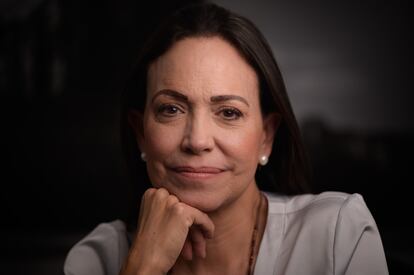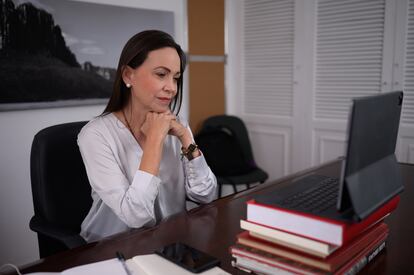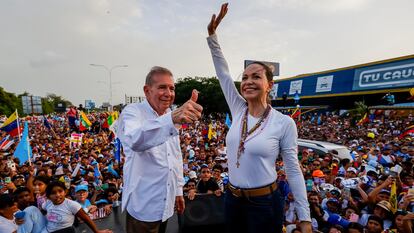María Corina Machado: ‘Edmundo and I are willing to ensure a peaceful transition’
In an interview with EL PAÍS, the Venezuelan opposition leader expresses her confidence that Chavismo will accept electoral defeat if voted out on July 28


Venezuela is experiencing an unusual presidential campaign. The main protagonist is not even a candidate due to the ban imposed on her by the courts. In the Miraflores Palace, the seat of government, the feeling was that the number one obstacle preventing President Nicolás Maduro from renewing his term for another six years had been removed. They were wrong. María Corina Machado gave her place to Edmundo González Urrutia, a retired diplomat who was little known outside his circle of friends. Machado’s decision to tap Urrutia on the shoulder and have him in her campaign van traveling all over the country has made him very popular, to the extent that the most reliable polls place him clearly ahead of Maduro, although Chavismo insists these forecasts do not represent reality. Machado’s plan now threatens the continuity of 25 years of the Bolivarian revolution. The primary opposition leader spoke to EL PAÍS via videocall from Caracas. In seven days, she views herself accompanying an historic transition.

Question: What do the polls tell you today?
Answer. The serious polls are all overwhelmingly aligned in favor of Edmundo González. We are talking about a difference that already exceeds 30 points — some say 40 points — and we continue to grow every day. However, it is not about the polls. It is what we are measuring in the street. Anyone in Venezuela today will tell you this represents unprecedented energy in favor of the desire for change and the determination to enforce this decision that Venezuelans are making. We have already defeated Chavismo in the streets.
Q. Would Chavismo accept defeat?
A. We are asking for the votes to be counted. I am convinced that there will be huge participation even if they put up obstacles in terms of transportation or public services. Despite what the regime is attempting to achieve through violence, people are going to go out, people are going to vote. This is a day that for Venezuelans represents the opportunity to be reunited with their families [seven million Venezuelans have left the country in recent years]. What I ask is that we Venezuelans go out and stay out in a civic and organized way. The votes have to be counted.
Q. The document promoted by Presidents Gustavo Petro and Lula da Silva on the acceptance of the results by both the Maduro government and you, the opposition, has not been signed. Are you concerned that this matter remains unresolved?
A. I am not even aware of the document; neither Edmundo nor myself.
Q. It was a method of ensuring the results are respected and for a peaceful transition and sustainable governability after July 28.
A. The results will be up to Maduro to accept. Venezuelan society will be in charge of enforcing them. International politics has a very important role, because the outcome of July 28 will be decisive for many generations of Venezuelans. This is the opportunity to carry out a peaceful transition and Edmundo and I have been clear that we are willing to move forward in a real negotiation process to ensure a peaceful transition.
Q. How do you imagine a scenario in which Edmundo González wins the elections and Maduro is in control of the institutions for six more months? The transfer of power would take place on January 10, 2025.
A. Put that way it sounds very complicated because, additionally, we are talking about a very delicate situation. We are in a critical situation in terms of the quality of life of Venezuelans. People will want to see results. Of course, there will be complex demands and it will be up to us to assure all those Venezuelans who did not vote for us, or did not participate, that they are part of this enormous national scope. We are going to assure Venezuelans that this is not a process of revenge, but a process to achieve democratic institutionality.
That thesis of the internal enemy has been dismantled with the facts. There is no enemy here. The country is united as never before”
Q. What would your role be in that transition?
A. I am going to continue doing what I have done so far, to fulfill a first mandate [Machado won more than 90% of the vote in an opposition primary] that reaches a fundamental milestone on July 28. After that, there is a lot of room for maneuver.
Q. There is a lot of talk about the loyalty of the armed forces to Chavismo. Do you have any contacts within the military that have assured you there are factions that are ready for a change?
A. I have a lot of contact with the armed forces because of my travels around the country. What I have been seeing over the last few days has been amazing. Their eyes are shining at the imminence of the possibility of a process of profound change and family reunification. They also have children and siblings; they have witnessed the looting of the country and the way in which human rights have been affected. They are under no illusions about this violence and the threat from Maduro. For there to be a war, there has to be an enemy [Maduro was recorded telling a family member that if the opposition won there would be an armed conflict]. The country has unified. That thesis of the internal enemy has been dismantled with the facts. There is no enemy here. The country is united as never before.
Q. Why did Maduro open himself to negotiations with the White House just two weeks before election day? What do you think the president is looking for?
A. As the elections approach, they have seen that their strategies of violence and repression have had no effect. When you destroy the roads, when you persecute drivers, when you do not supply gasoline for 10 days, people realize that all lines are being crossed. They can see that this is a strong movement and within Chavismo this is the case. It has already happened with the grassroots. There are sectors that have different visions. There are some who say that change is inevitable and want to understand how to integrate this new order, while there are others who do not want to leave [power]. At the end of the day, it is within the regime itself where changes are taking place. I hope and trust that the reasonable and sensible position of those who think about the interests of everyone will prevail, even in accepting the results.

Q. Is there any support from the moderate sectors of Chavismo? We saw a survey in which 12% of Chavismo hardliners advocated for change.
A. That is gathering pace with each passing minute. At the rallies, which are multitudinous, people come up to me and say: I am a Chavista, I belonged to the collective and I was wrong! It is a process of national redemption. This is very powerful. Whoever views this from an electoral perspective is only scratching the surface. This goes beyond: it is a social process.
Q. We’ve had some windows for change before. However, do you think this is the big opportunity for a transition?
A. I think so, absolutely.
Q. If on election day, or the days that follow, the National Electoral Council (CNE) does not announce a result for whatever reason, are you afraid of what could come?
Q. Maduro has admitted it. His campaign is repression. Our campaign events are devoid of trucks, devoid of sound [systems]. Through violence, or the threat of violence, he tries to dissuade anyone from participating. This, inwardly, doesn’t work in his favor. “It’s either me or it’s chaos,” as [Hugo] Chávez used to say. And it turns out that he’s the one who is chaos, they are chaos. I believe that the international community no longer falls for that blackmail. [Chavismo] now understands that despite all the provocations and all the brutal attacks it is going to lose. I have 24 people in prison, 72 people arrested in two weeks of campaigning. We have not fallen into the trap of violent provocations. That does not mean that we are weak. We stand firm. That is how we have made progress. I believe that this message has no effect either on the population or on the military, who are the last ones who want a war. To pit the military against each other or against Venezuelan civil society; that is not going to happen. That is not what Venezuelans want. I believe that the antidote is a very high citizen representation.
There are seven million displaced Venezuelans. We need them all back. Those who are political and those who are not political. Those who have been persecuted and those who have not been persecuted. This is a new era. We need them all”
Q. What would you ask of Antonio Ecarri or Enrique Márquez, two other opposition candidates still in the race?
A. They know what they have to do.
Q. What do they have to do?
A. What is in the best interests of Venezuela.
Q. Withdraw?
A. It is already too late.
Q. Would you ask them to vote for Edmundo González?
A. To be honest with you, that migration of votes has already occurred without these leaders asking for it. People are clear that Edmundo represents change.
Q. There is talk, in the case of an opposition victory, of a government of consensus in which some Chavista sectors would be included.
A. I believe that the criterion the president will use will be to seek the logic of peace.
Q. What strategy would an Edmundo González government adopt a year from now?
A. We could talk about many measures, but for me the most important thing is how we recover confidence. This is a task for all of us. To build very solid ethical and liberal pillars. That starts from day one, before formally assuming the presidency.
Q. What would a Donald Trump victory in the U.S. in November mean for Venezuela?
A. The relationship with Venezuela is going to be maintained, there’s been a firm policy of support for democracy and support for the popular sovereignty to be expressed on July 28.
Q. Would you include other opposition figures such as Leopoldo López [a dissident who attempted to lead an uprising against the Maduro government], for example, in a consensus government? Would you explore an amnesty?
A. There are seven million displaced Venezuelans. We need them all back. Those who are political and those who are not political. Those who have been persecuted and those who have not been persecuted. This is a new era. We need them all.
Q. I asked you specifically about Leopoldo López.
A. Him too, of course.
Q. Would Juan Guaidó, the leader of the former interim government, play a role?
A. You’d have to ask Edmundo about that.
Q. What has your relationship with Edmundo González been like? Is the shared leadership, which is not easy in the political world, occurring naturally?
A. We have a great relationship. We knew each other, we had respect and affection for each other, but we were not close friends. Now we are a team, a real team. He has done a spectacular job, in two months going from being practically unknown to emerge as the candidate with more than 60% of voter intention. It’s amazing. We want a country that can move ahead, happy. We do not want violence.
Q. How are you feeling about everything that lies ahead?
A. Excited, very grateful for the trust I have received from so many Venezuelans. Very conscious of the responsibility we have, and grateful to God for what we are experiencing.
Sign up for our weekly newsletter to get more English-language news coverage from EL PAÍS USA Edition
Tu suscripción se está usando en otro dispositivo
¿Quieres añadir otro usuario a tu suscripción?
Si continúas leyendo en este dispositivo, no se podrá leer en el otro.
FlechaTu suscripción se está usando en otro dispositivo y solo puedes acceder a EL PAÍS desde un dispositivo a la vez.
Si quieres compartir tu cuenta, cambia tu suscripción a la modalidad Premium, así podrás añadir otro usuario. Cada uno accederá con su propia cuenta de email, lo que os permitirá personalizar vuestra experiencia en EL PAÍS.
¿Tienes una suscripción de empresa? Accede aquí para contratar más cuentas.
En el caso de no saber quién está usando tu cuenta, te recomendamos cambiar tu contraseña aquí.
Si decides continuar compartiendo tu cuenta, este mensaje se mostrará en tu dispositivo y en el de la otra persona que está usando tu cuenta de forma indefinida, afectando a tu experiencia de lectura. Puedes consultar aquí los términos y condiciones de la suscripción digital.








































